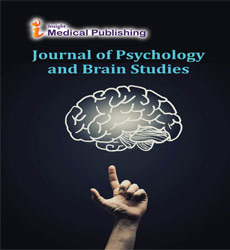Intellectual Disability in Children with Autism
Robert Coin*
Department of Psychology, University of Southern Queensland, Springfield Central, Australia
- *Corresponding Author:
- Robert Coin
Department of Psychology
University of Southern Queensland, Springfield Central, Australia
E-mail: coinrob23@yahoo.com
Received Date: November 07, 2021; Accepted Date: November 21, 2021; Published Date: November 28, 2021
Citation:Coin R (2021) Intellectual Disability in Children with Autism. J Psychol Brain Stud Vol.5 No.11:55.
Brief Report
In the most recent edition of the Diagnostic and Statistical Manual of Mental Disorders, Autism Spectrum Disorder (ASD) is defined as a single diagnostic category with impairments in two dimensions: social communication and confined, repetitive patterns of behaviour, interests, and activities (RRBI). However, there is a great deal of variation in the aetiology, presentation, and treatment response among autistic people. Previous research has used cluster analysis to establish meaningful ASD subgroups based on empirical features that may reflect clinical symptoms in order to improve phenotypic uniformity.
Exploring the heterogeneity in the behavioural expression of ASD symptoms may require a focus on cognitive performance. Surprisingly, while accounting for around two-thirds of the ASD population, few studies concentrating on phenotypic traits have revealed prospective subgroups of children with ASD without intellectual disability (ID). Importantly, it's unclear to what extent the cognitive and social deficits exhibited in ASD is related to the severity of the disorder's symptomatology. A study identified two clusters: 'high severity' and 'low severity,' with differing levels of social-communicative and restricted-repetitive behavioural abnormalities in each.
More specifically, the two clusters were split into two groups based on the two blocks of ASD symptoms. The first profile had greater social and communicative difficulties and less repetitive behaviours, whereas the second profile had higher social and communicative abilities but more repetitive behaviours. Several studies have discovered two categories using cluster analysis and language measurements. Within a group of ASD and TD children, the score of spoken no word repetition and phrase repetition revealed two clusters. Cluster 1 had inferior verbal proficiency and a tendency to have more severe autism symptoms than Cluster 2. A cluster analysis employing children's communication features yielded similar results. One of the two subtypes was linked to low language competence and severe autistic symptoms, whilst the other was linked to relatively good language competence and milder autism symptoms.
Stress is an unavoidable part of parenting, and it's been accepted as a normal and healthy response to the obligations of caring for a child. Even while most families experience parenting stress, having a kid with autism spectrum disorder (ASD) increases the risk of stress for both parents, particularly moms. Indeed, it is generally known that parents of children with ASD experience more general stress than parents of usually developing children or parents of children with other developmental disabilities. Many traits of children with ASD might be stressful for their families. Understanding the association between these kid features and parenting stress is important for better understanding the experience of parents of children with ASD, which could lead to more targeted interventions to help families.
ASD is a diverse illness with a wide range of behavioural profiles in terms of symptoms and presentations, all of which might affect parenting stress in different ways. Some of the important kid traits that may operate as stressors are age and intensity of behavioural issues in ASD. While several studies have found that the severity of ASD and many child factors contribute to parental stress, the findings on which type of child factor contributes the most to parenting stress are mixed. Some research implies that child behaviour difficulties, in addition to the severity of ASD, explain for diversity in parenting stress. Other research suggests that parenting stress patterns are similar to child behaviour problems, but that an autism diagnosis adds to stress once behaviour problems are taken into account. The current study intends to build on previous research by looking into the relationship between parenting stress and child variables in moms of children with ASD and comorbid intellectual handicap (ASD-ID).
Open Access Journals
- Aquaculture & Veterinary Science
- Chemistry & Chemical Sciences
- Clinical Sciences
- Engineering
- General Science
- Genetics & Molecular Biology
- Health Care & Nursing
- Immunology & Microbiology
- Materials Science
- Mathematics & Physics
- Medical Sciences
- Neurology & Psychiatry
- Oncology & Cancer Science
- Pharmaceutical Sciences
